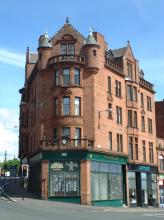Debased or Evolved?

From the end of the 1920s the advent of talking movies, radio and television, from which Scots was excluded, ensured that Scots speakers were now regularly exposed to the English sound system and, in particular, the American form. In 1948, for instance, the writer Naomi Mitchison claimed of Glasgow children They do not speak any real variety of Scots, but a blurred, debased English, or since 1942 American. The Third Statistical Account described the relationship between Glasgow Scots speakers and the media in 1958:
They are inclined to be intolerant of city produced programmes and they are practically unanimous in running down the Glasgow accentin the cinema a Glasgow audience responds with laughter to any use of the Glasgow accent from the screen.
Having said that the same writer commented further although Glasgow cinemagoers laugh at the Glasgow accent on the screen, they tend to dislike what they call the English accent. On the other hand, the same Account described the flourishing state of the Glasgow dialect in the theatres and music halls in which it is possible for English visitors to spend an evening there and not understand one word of the comic sketches. What these accounts describe is the way in which the education authorities had succeeded in conditioning Glasgow people to self-censure their own language in favour of English and to self-denigrate Scots generally. As part of this process, speakers in Glasgow have discarded certain key markers of Scots. For example, no Glaswegian born and bred today would use the Scots words awa, ken, nicht or twa but rather the English forms away, know, night and two. However, it was not so long ago that these Scots forms were common to Glasgow. For example, the newspaper columnist and novelist, Neil Munro (author of Para Handy) often represented Glasgow speech in his writings around 1900. In these writings Scots forms such as hae, gang, mak awa etc are common. From 1944 onwards the late and much-loved cartoonist Bud Neil represented Glasgow speech too in the Evening Times newspaper. Once again forms such as awa, feenish, guid, ither, ken, meenit, mither, sair, tak etc are common. It is interesting that Bud Neil often represented the most traditional speakers as women. It is apparent that as older speakers died off in the first half of the 20th century the English forms began to take over having been forced on younger people through the schools and media. The dialect also started to be referred to by its speakers as The Patter a combination of Scots, some English, and many terms current on the street that had been drawn from various origins.
Despite the changes taking place in Glasgow speech, there are few Scots-based dialects spoken in Scotland today which regularly coin so many phrases and words for modern concepts in life. For instance, Glasgow has given Scots haunder (helper), weel-quotit (highly regarded), tummle doun (dilapidated), tick man (insurance agent), picker (connoisseur), tuimheidit (ignorant) and many others. Glaswegian can, and does, absorb Scots from other regions too. For instance bidie-in (co-habitee), which originated in the north east, is known and used in the city.